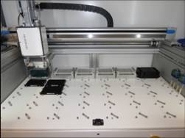Research facilities
DNAmarkerpoint
- Application
- The main purpose of DNAmarkerpoint is to better understand the ecology, evolution and biodiversity through the study of ancient- and modern DNA.
- Availability
- DNAmarkerpoint is open for all students, PhD-students and researchers of the three parental institutes. To start research, please contact Klaas Vrieling. For new lab-users it is obligatory to be registered and follow a short course. Without this you are not allowed to work in the lab.
- Location
-
Sylvius
Sylviusweg 72
2333 BE Leiden
- Contact
- Klaas Vrieling
DNAmarkerpoint consists of two facilities, the modern-DNA lab in the Sylvius building and the ancient-DNA lab in the van Steenis building. DNAmarkerpoint is designed to serve the molecular needs of its three parent institutes: Institute Biology Leiden, National Centre of Biodiversity and the Faculty of Archeology.
Facility Sylvius building
The laboratory in the Sylvius building is equipped for DNA- and RNA extractions, PCR amplification, cloning, sequence- and fragment analysis and ‘downstream’ amplification and analysis of the DNA extracted in the ancient-DNA facility.
Facility van Steenis building
The ancient-DNA facility in the van Steenis building is equipped for recovering DNA from plant and animal material from museum collections and fossils. It permits research that would otherwise not be possible, such as the study of ancient populations and museum material. The ancient-DNA lab provides an environment where the risk of contamination with contemporary DNA is minimal.
Each of the participating groups has a team-leader who is responsible for their lab-users:
- Institute of Biology Leiden: Klaas Vrieling, Michael Richardson, Maurijn van der Zee
- Naturalis Biodiversity Center: Arjen Speksneijder
- Faculty of Archeology: Matthijs van Kolfschoten
For First Aid and Emergency situations Dial:
- 5005 from 8:00 till 17:15h
- 4444 or 112 from 17:15h till 8:00
- 4600 in weekends and after hours for technical emergencies
Pre-and Postlab
In order to minimize contamination of samples with foreign notably amplicons, pre PCR work is physically separated from post PCR work. There is a very strict policy to keep pre and post PCR works separated.
Responsibilities

You’re welcome to work in the lab, but:
- keep your workplace clean
- refill empty tip boxes
- dispose full waste bags
- place pipettes back on the standards
- keep the pipettes clean
- gives a brief description of her/his project in the MUG-meeting
- gives a final presentation at the end of the project or internship
Protocols
Lab-related protocols are available in hard-copy or digital form from the management of DNAmarkerpoint.
Available commercial kits in the lab:
Follow this link to make a reservation. Please ask Onno Schaap for the inlog codes. After you have made your reservation, please refresh the page to view the latest changes.
Since January 2013, the Institute of Biology Leiden has a SNPline operational which can be used for the detection of SNP’s (Single Nucleotide Polymorphisms). The detection is based on allele-specific labeled primers and the acquired equipment allows high throughput (>100.000 datapoints per day) genotyping. Primer and assay design are done with the dedicated Kraken software based on sequences of 50 bases long on either side of the SNP. Kraken is a multipurpose LIMS software that tracks all samples and assays while being processed.
The use of the equipment is in joint venture with the Leiden Genome Technology Center and makes it easy for users to combine their results from next generation sequencing or microarray experiments with the SNP analysis.

We already have a lot of experience with isolating DNA from a broad range of species and in combination with the SNPline running, we have another valuable tool in our molecular ecology-, evolution- and biodiversity-based research at Leiden University.

The use of the Kraken software for the design of the primers and assays results in a 80% success rate of the assays prior to any optimalisation, when good quality DNA is used. The DNA input for the SNPline depends on the genome size but is around 5 ng for each human SNP to be detected. The Replikator pipetting robot can handle any amount of DNA, but at least 24 samples are needed to be able to do a reliable genotype calling.
